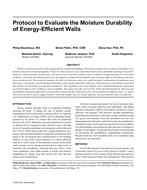
Protocol to Evaluate the Moisture Durability of Energy-Efficient Walls
- Comments Off on Protocol to Evaluate the Moisture Durability of Energy-Efficient Walls
- ASHRAE
Walls account for about 8% of the energy used in residential buildings. This energy penalty can be reduced with higher insulationlevels and increased airtightness. However, these measures can compromise the moisture durability and long-term performanceof wall assemblies because they can lead to lower moisture tolerance due to reduced drying potential. To avert theseproblems, a moisture durability protocol was developed to evaluate the probability that an energy-efficient wall design will experiencemold growth. This protocol examines the effects of moisture sources in walls through a combination of simulations andlaboratory experiments, uses the mold growth index as the moisture durability indicator, and is based on a probabilistic approachthat utilizes stochastically varying input parameters. The simulation tools used include a new validated method for taking intoaccount the effects of air leakage in wall assemblies. This paper provides an overview of the developed protocol, discusses theprobabilistic simulation approach, and describes results from the evaluation of two wall assemblies in Climate Zones 2, 4, and 6.The protocol will be used to supply builders with wall designs that are energy efficient, moisture durable, and cost-effective.
Citation: Thermal Performance of Exterior Envelopes of Whole Buildings XIII, Conference Papers
Product Details
- Published:
- 2016
- Number of Pages:
- 12
- Units of Measure:
- Dual
- File Size:
- 1 file , 3.2 MB
- Product Code(s):
- D-BldgConf16-21

